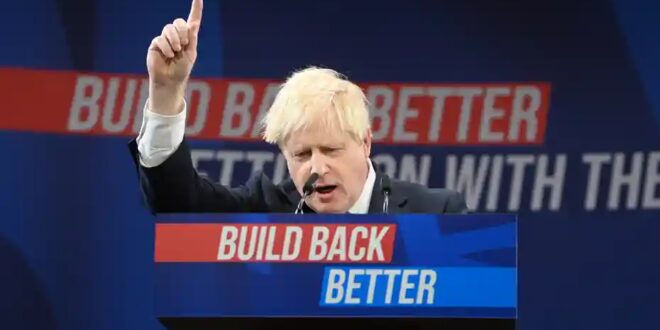A detail in the story of Brexit, often forgotten, is Boris Johnson’s support for Theresa May’s withdrawal agreement at a third Commons vote in March 2019. Having resigned from the cabinet in protest at Mrs May’s plan, he endorsed it, not because he changed his mind about the content, but because it seemed expedient in the moment. The motive was fear of losing Brexit altogether; the intention was to kill Britain’s EU membership, take any deal available and then try to change it from the outside.
Mrs May lost that vote. Mr Johnson became prime minister and his sign-and-renege strategy became government policy. Hence the decision in October 2019 to agree to the Northern Ireland protocol, placing a customs border in the Irish Sea. Dominic Cummings, Mr Johnson’s chief adviser at the time, has said that there was never intent in Downing Street to stick with the terms of what had been agreed. A typically self-serving and pugnacious Twitter outburst by Mr Cummings included the assertion that “cheating foreigners is a core part of the job”.
Mr Johnson might not hold that view, but nothing in his behaviour regarding Northern Ireland and its painstakingly negotiated special status indicates good faith or commitment to honest diplomacy. On Tuesday, Lord Frost, Mr Johnson’s minister for Brexit, made a speech demanding that the protocol be scrapped and replaced with a new treaty. He was particularly insistent that the European court of justice no longer have any jurisdiction in Northern Ireland. As Mr Johnson knows, that court is intrinsic to the operation of single-market rules, which apply in Northern Ireland to avoid the requirement for a hard border with the Republic of Ireland. Mr Frost’s demand amounts, in essence, to detonating the foundations of the deal. In Downing Street’s view, it is an intolerable affront to national sovereignty to have EU rulings applicable anywhere on UK territory under any circumstances.
To make the demand at all suggests intransigence. To make it the day before the European Commission was due to propose its own technical remedies to operational problems with the protocol was downright provocative. Those plans, laid out on Wednesday by Maroš Šefčovič, the commission vice-president responsible for Brexit, were practical and technical in much the way that Mr Frost’s contribution was not. The EU is offering a high degree of flexibility in customs enforcement and regulatory checks, effectively applying a lot more benefit of the doubt so that many more goods can cross from Britain to Northern Ireland unimpeded. Such an arrangement would have been considered a dramatic concession and a victory for Brexiters had it been offered at an earlier stage in the process. Some EU members, notably France, are uncomfortable with the plan for precisely that reason. It seems to reward British intransigence. Seasoned followers of Tory politics know that the Eurosceptic appetite is insatiable and that concession is always swallowed without gratitude and followed by more demands.
The EU offer is a gamble. Mr Šefčovič described it as turning its existing rules “upside down and inside out”. It is generous enough that UK rejection would prove that Mr Johnson prefers conflict to resolution. If the goal is making Brexit work for Northern Ireland, Mr Šefčovič’s proposals are the basis for agreement. To insist instead on scrapping the protocol entirely would be to make Northern Ireland a hostage in a reckless game of political brinksmanship that could quickly escalate to an expensive and needless trade war. That is the choice facing Mr Johnson. He is being offered a diplomatic solution to a problem of his own making. It costs him little to accept; it costs Britain a great deal if he refuses.
 Eurasia Press & News
Eurasia Press & News



